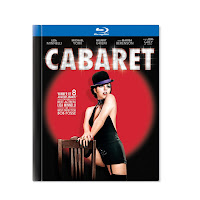Blu-rays of the Week
Cabaret
(Warners)
Bob Fosse won the Best Director
Oscar for his decidedly adult 1972 adaptation of the classic Kander & Ebb
musical about pre-Nazi Germany, as did Liza Minnelli and Joel Grey for their
indelible performances. (The film lost Best Picture to a crime drama named The Godfather.) For its belated 40th
anniversary Blu-ray edition, Warners has released a rewarding hi-def transfer with
an appropriately dark and grainy look. In addition to a perfect film, the disc
includes historian Stephen Tropiano’s commentary and new and vintage
featurettes with cast and crew extolling the virtues of director Fosse.
Citadel
(Flatiron)
Ciaran Foy’s routine thriller is
set in a run-down apartment complex where a widowed new dad gets revenge for a
vicious attack that left his poor (and pregnant) wife with fatal wounds. With
its shadowy darkness, fancy camera angles and standard-issue villains, the
movie tries to obscure the less than compelling storyline, acting and thrills:
even the explosive finale fizzles. The actors can’t do much with the thin gruel
they’ve been fed. The movie looks good in Blu-ray; extras comprise interviews and
an on-set featurette.
Pina
(Criterion)
Wim Wenders’
affecting elegy for modern-dance choreographer Pina Bausch (who died in 2009)
alternates between reenactments of signature pieces—like a scintillating Rite of Spring—and touching
reminiscences from colleagues, a truly international group: German, French,
British, Spanish, Russian, Japanese. Wenders intercuts among Bausch’s dances,
staged in a theater and outdoor places ranging from Berlin street corners,
public transit and even a picturesque hillside. Shot in 3D—which looks
marvelous on the Criterion Collection’s first 3D Blu-ray release—Pina is a lasting memorial from one
artist to another. Extras include Wenders’ commentary and interview, deleted
scenes with Wenders’ commentary, 45-minute making-of featurette and behind the
scenes footage.
Tales of the Night
(New Video)
In this fantastical animated
film, director Michel Ocelot tells a series of folk tales set in different
cultures and eras—from Tibet to Africa to Medieval Europe—with a stunning, highly
original visual style. The characters’ silhouettes are set against fabulous backdrops
that are a riot of color: this is the jumping off point for a memorable trip
into several glorious new worlds. Needless to say, on Blu-ray, the movie looks
absolutely dazzling; extras are two director interviews.
That Obscure Object of Desire
(Lionsgate)
Luis Bunuel’s final film, from
1977, was among his least interesting, even more so than the overpraised ones
that preceded it (The Discreet Charm of
the Bourgeoisie, The Phantom of the Liberty). The arbitrary surrealism
palls early on, and though suave Fernando Rey tries hard as an ambassador who
falls hard for a beautiful young woman—played alternately by Carole Bouquet and
Angela Molina, an unfunny conceit less amusing and more pointless in execution—this
is probably the most forgettable Bunuel film in a storied but checkered career.
The Blu-ray image is decent; extras include interviews with screenwriter
Jean-Claude Carriere, Bouquet, Molina and director Carlos Saura, and a Bunuel
featurette.
DVDs of the Week
Dirty Energy
Dirty Energy
(Cinema Libre)
Bryan D. Hopkins’ documentary startlingly
documents the aftermath of the infamous BP Gulf oil spill, and—through interviews
with those most affected by the disaster—arrives at the conclusion that there
was a massive cover-up. Based on this film, it seems indisputable that BP’s grievous
misdeeds were covered up by a complicit government which did not want the
corporation look bad in everybody’s eyes. Extras include an update, Three Years After the Spill, and a gulf
shrimp featurette.
Hello I Must Be Going
(Oscilloscope)
Although it often flounders
badly, with too many pratfallish scenes of its divorced (and depressed) heroine’s
overtly physical responses of her difficulties, Todd Louiso’s portrait of a
30ish woman regaining her self-esteem through an affair with a much younger man—and
keeping it from her busybody family—is certainly not the disastrous indie flick
it could have been. In the lead, Melanie Lynskey is frisky and endlessly
resourceful, while Blythe Danner is a powerhouse as her overbearing mom. Extras
include Louiso and Lynsky interviews.
Seven Psychopaths
(Sony)
Martin McDonough returns with another
twisted tale of crazy gangsters, this time with a dollop of dog napping. McDonough’s
problem (as in In Bruges) is that what
works onstage in his plays (notably A
Behanding in Spokane) sits inertly onscreen as various idiots out-mock one another
before shooting one another dead. It’s a yuckfest in both the comic and violent
senses that its cast obviously enjoys—in a better movie, Christopher Walken,
Colin Farrell, Sam Rockwell and Woody Harrelson would not quickly turn annoying,
while invaluable Abbie Cornish and Olga Korylenko are mercilessly wasted.
Extras include featurettes and interviews.
17 Girls
(Strand)
Based on a true story of a group
of Massachusetts high school students who got pregnant around the same time and
scandalized their town, sisters Delphine and Muriel Coulin’s debut film relocates
to their grubby hometown of Lorient in northern France. Although Jean-Louis
Vialard’s photography gleamingly captures the lives of those stuck in this
nothing town, the sisters’ insistence on refusing to take a stance (moral or
otherwise) on their naïve teen protagonists prevents 17 Girls from taking flight. Their actresses, led by The Class’ Louise Grinberg, are superb, but
they can’t overcome stereotypes.
Whores’ Glory
(Kino)
In this scrupulously non-judgmental
examination of prostitutes across several continents and cultures, director Michael
Glawogger simply records how these women are treated by johns and madams alongside
how they perceive one another outside of work. Similar to Frederick Wiseman, Glawogger
simply sits back and observes, although by film’s end, 120 minutes of much
repetitiveness makes the whole much less than the sum of its parts.
CDs of the Week
Britten
(Channel Classics)
This fine recording of a
trio of Benjamin Britten’s most enduring compositions—the song cycles Les Illuminations and Serenade and the
orchestral Frank Bridge Variations—begins
the Britten centenary (he was born in 1913) auspiciously. Soprano Barbara Hannigan sounds exquisite in the lovely Illuminations, tenor James Gilchrist and horn player Jasper de Waal
wax lyrical throughout Serenade, and the Amsterdam Sinfonietta under
Candida Thompson’s leadership give the Bridge Variations a great workout. The spacious surround
sound underlines Britten’s orchestral writing genius.
Brundibar
(Hyperion)
In the 90s, Entartete musik (degenerate music)—by composers killed or displaced
by the Nazis—was in vogue with dozens of welcome recordings: this new CD of works by four of them returns their vital voices to listeners. Hans Krasa’s
delightful suite from his children’s opera Brundibar,
Viktor Ullmann’s piercing String Quartet No 3, Gideon Klein’s playful String
Trio and Pavel Haas’s absorbing and monumental String Quartet No. 2 are brilliantly played by members of the immensely talented Nash Ensemble, which brings
this forgotten music front and center again.












No comments:
Post a Comment